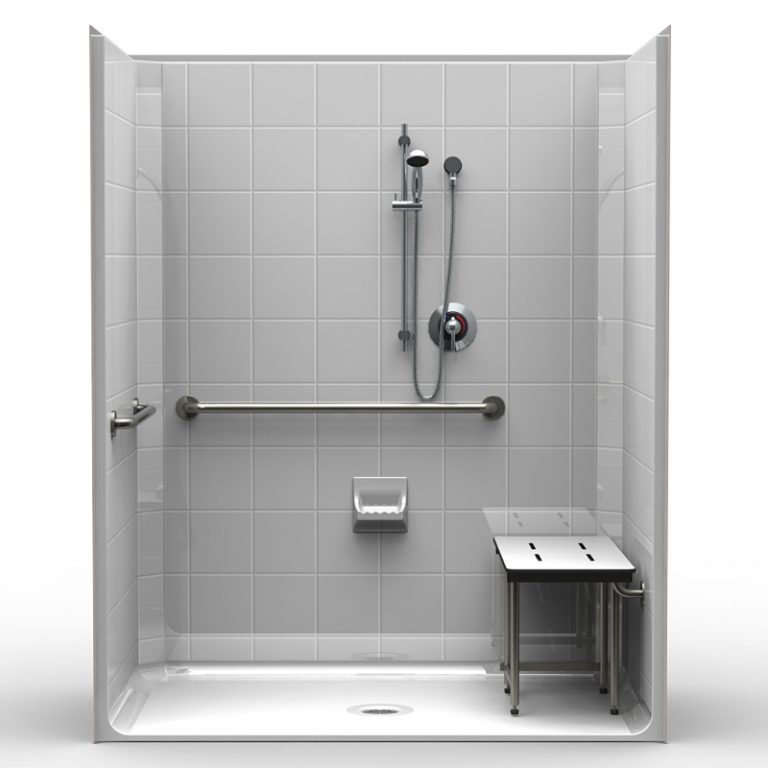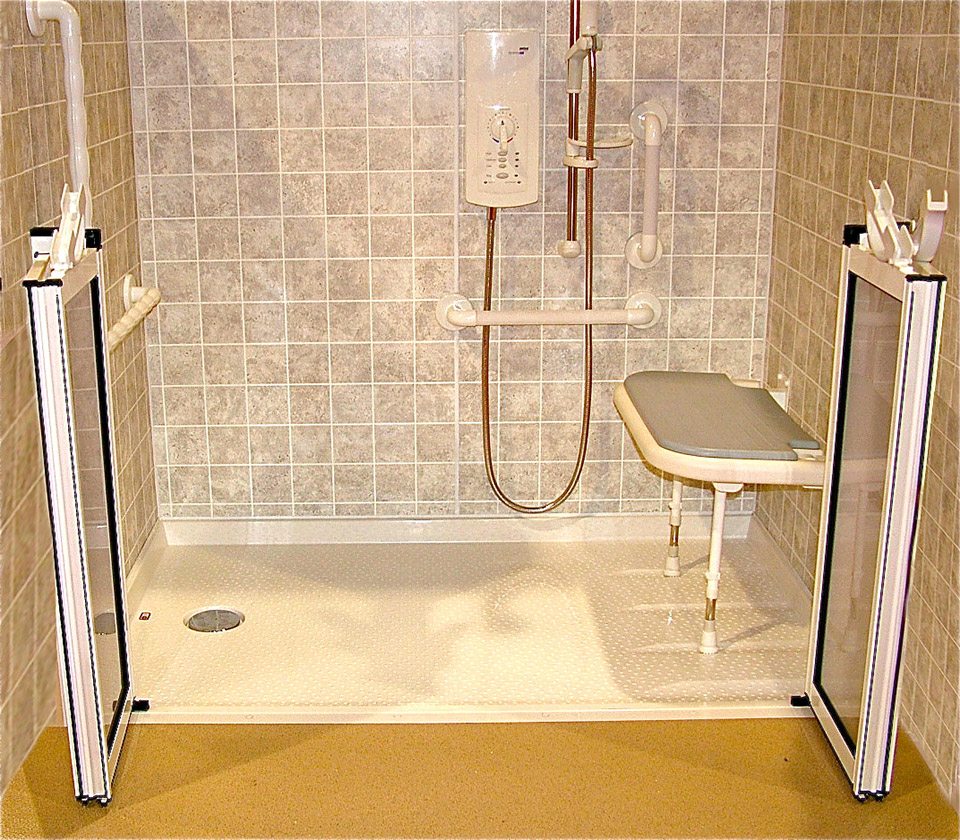The Importance of Accessible Bathrooms

Accessible bathrooms are essential for individuals with mobility limitations, providing them with the dignity and independence they deserve. They ensure that everyone, regardless of their physical abilities, can comfortably and safely use bathroom facilities.
Benefits for Individuals with Mobility Limitations
Accessible bathrooms offer numerous benefits for individuals with mobility limitations. These benefits contribute to improved quality of life, increased independence, and enhanced well-being.
- Enhanced Independence: Accessible features like grab bars, shower seats, and raised toilet seats allow individuals to perform personal hygiene tasks independently, reducing reliance on caregivers and promoting self-sufficiency.
- Improved Safety: Features such as non-slip flooring, adequate space for maneuvering, and clear pathways minimize the risk of falls and accidents, creating a safer environment for individuals with mobility challenges.
- Increased Comfort and Dignity: Accessible bathrooms provide a comfortable and dignified experience for individuals with disabilities, allowing them to maintain their privacy and personal hygiene with ease.
- Improved Physical and Mental Health: The ability to maintain personal hygiene and participate in daily routines can positively impact an individual’s physical and mental health, promoting self-esteem and overall well-being.
Real-Life Stories and Case Studies
The impact of accessible bathroom features is evident in countless real-life stories and case studies.
- A Senior Citizen with Arthritis: An elderly individual with arthritis found it increasingly difficult to use a standard bathroom. Installing grab bars and a raised toilet seat significantly improved their safety and independence, allowing them to continue living in their home comfortably.
- A Person with Spinal Cord Injury: A person with a spinal cord injury benefited greatly from an accessible bathroom equipped with a roll-in shower, adjustable shower head, and a wheelchair-accessible toilet. These features provided them with the ability to maintain their personal hygiene independently and with dignity.
Legal and Ethical Considerations
The design and implementation of accessible bathrooms are guided by legal and ethical considerations.
- The Americans with Disabilities Act (ADA): This landmark legislation requires public accommodations, including restrooms, to be accessible to individuals with disabilities. The ADA establishes specific guidelines for bathroom design, ensuring that they meet the needs of diverse individuals.
- Ethical Considerations: The ethical principle of inclusivity underscores the importance of accessible bathrooms. It emphasizes the right of all individuals, regardless of their physical abilities, to participate fully in society and enjoy equal access to public facilities.
Handicap Bathroom Shower Seats

Handicap bathroom shower seats are essential for individuals with mobility challenges, providing stability and safety during showers. These seats are designed to offer a secure and comfortable place to sit while showering, reducing the risk of falls and promoting independence.
Types of Handicap Bathroom Shower Seats
Handicap bathroom shower seats come in various types, each offering unique features and benefits. Understanding the different options available can help you choose the best seat for your specific needs.
- Wall-mounted Shower Seats: These seats are attached to the wall, providing a stable and secure base. They are often adjustable in height, allowing for customization to fit different users. Wall-mounted shower seats are ideal for individuals who need a secure and stable seating option during showers.
- Free-standing Shower Seats: These seats are not attached to the wall and can be moved around as needed. They are often lightweight and easy to transport, making them suitable for use in multiple locations. Free-standing shower seats are ideal for individuals who need a portable seating option for showering.
- Folding Shower Seats: These seats fold down for easy storage and are often lightweight and easy to transport. They are a good option for individuals who need a space-saving shower seat or who may need to use the seat only occasionally.
- Transfer Benches: These benches are designed to assist individuals in transferring from a wheelchair to the shower seat and back. They have a built-in seat and a padded backrest, providing a comfortable and safe transfer experience.
Key Features of Handicap Bathroom Shower Seats
Several key features contribute to the safety and comfort of handicap bathroom shower seats. These features vary depending on the type of seat and manufacturer, but some common features include:
- Materials: Shower seats are typically made from durable and water-resistant materials such as aluminum, stainless steel, or plastic. Some seats are coated with antimicrobial materials to prevent the growth of bacteria and mold.
- Weight Capacity: The weight capacity of a shower seat is an important consideration, especially for individuals who are heavier or may need to support a caregiver during transfers. Most shower seats have a weight capacity of 250-300 pounds, but some can support up to 500 pounds.
- Adjustability: Some shower seats are adjustable in height, allowing for customization to fit different users. This feature is particularly important for individuals with varying heights or mobility needs.
- Safety Features: Shower seats often include safety features such as non-slip surfaces, padded armrests, and grab bars. These features help to prevent falls and provide a secure and comfortable seating experience.
Benefits of Using a Shower Seat
Using a shower seat offers numerous benefits for individuals with mobility challenges, including:
- Improved Stability: A shower seat provides a stable base to sit on during showers, reducing the risk of falls and injuries. This is particularly important for individuals who have difficulty standing or balancing.
- Reduced Risk of Falls: Falls in the bathroom are a common cause of injuries for older adults and individuals with mobility challenges. A shower seat can significantly reduce the risk of falls by providing a secure and comfortable place to sit.
- Enhanced Independence: A shower seat allows individuals with mobility challenges to shower independently, without the need for assistance from a caregiver. This can improve their quality of life and promote self-esteem.
- Increased Comfort: Shower seats provide a comfortable place to sit during showers, allowing individuals to relax and enjoy the experience. This is especially beneficial for individuals who have difficulty standing for long periods.
Choosing the Right Shower Seat: Handicap Bathroom Shower Seats

Selecting the appropriate shower seat is crucial for ensuring safety, comfort, and ease of use in the bathroom. The right shower seat can significantly improve independence and quality of life for individuals with mobility limitations. Factors to consider when choosing a shower seat include individual needs, bathroom space, and desired features.
Types of Shower Seats
There are several types of shower seats available, each with its unique features and benefits.
- Wall-Mounted Shower Seats: These seats are fixed to the wall and offer stability and support. They are ideal for individuals who require a secure and sturdy seat. They can be easily folded away when not in use to save space.
- Freestanding Shower Seats: These seats are not attached to the wall and can be moved around the bathroom as needed. They are ideal for individuals who require flexibility and ease of movement.
- Adjustable Shower Seats: These seats have adjustable height settings, allowing users to customize the seat height to their needs. This is particularly helpful for individuals with varying mobility levels or who use the shower seat for different purposes.
- Folding Shower Seats: These seats fold away for easy storage and can be used in small bathrooms. They are a good option for individuals who need a seat only occasionally.
Factors to Consider When Choosing a Shower Seat, Handicap bathroom shower seats
When choosing a shower seat, consider the following factors:
- Mobility Level: The level of mobility of the individual will determine the type of shower seat needed. For individuals with limited mobility, a sturdy and stable seat is essential. For those with greater mobility, a freestanding or adjustable seat may be more suitable.
- Bathroom Space: The size and layout of the bathroom will influence the type of shower seat that can be accommodated. For smaller bathrooms, a folding or wall-mounted seat may be the best option. For larger bathrooms, a freestanding or adjustable seat may be more appropriate.
- Desired Features: Some shower seats offer additional features such as armrests, backrests, and adjustable height settings. These features can enhance comfort and support.
- Material: Shower seats are typically made from materials like aluminum, stainless steel, or plastic. Aluminum and stainless steel are durable and rust-resistant, while plastic is lightweight and easy to clean.
- Weight Capacity: The weight capacity of the shower seat is important to consider, especially for individuals who are heavier.
Shower Seat Comparison Table
The following table compares different shower seat options, highlighting key features, pros, and cons:
| Type | Features | Pros | Cons |
|---|---|---|---|
| Wall-Mounted | Fixed to the wall, sturdy, stable | Secure, stable, space-saving | Requires wall installation, limited adjustability |
| Freestanding | Not attached to the wall, movable | Flexible, easy to move, adjustable height (some models) | May not be as stable as wall-mounted seats |
| Adjustable | Height-adjustable | Customizable height, suitable for varying mobility levels | May be more expensive, may require more space |
| Folding | Folds away for easy storage | Space-saving, easy to store, affordable | May not be as sturdy as other types |
Recommendations for Shower Seats
- For individuals with limited mobility: A wall-mounted shower seat with armrests and a backrest is recommended.
- For individuals with greater mobility: A freestanding or adjustable shower seat with armrests may be more suitable.
- For individuals with limited space: A folding or wall-mounted shower seat is recommended.
- For individuals with specific conditions: Consider a shower seat with features that address the specific needs of the individual, such as adjustable height, armrests, or backrests.
Handicap bathroom shower seats offer a vital safety feature for individuals with mobility limitations, providing stability and support during bathing. When it comes to monitoring overall health, maintaining a healthy weight is crucial, and having a reliable scale is essential.
You can find a comprehensive guide to choosing the best accurate bathroom scales 2015 to help you track your progress. Integrating these elements into your bathroom ensures a safe and functional space for all needs.
Handicap bathroom shower seats offer crucial support and safety for individuals with mobility challenges. When combined with a bathroom shower head extension , these seats create a more accessible and comfortable showering experience. The extension allows for greater reach and flexibility, ensuring a thorough and enjoyable shower even for those who need assistance.
This combination of accessibility features can significantly improve independence and quality of life for individuals with disabilities.